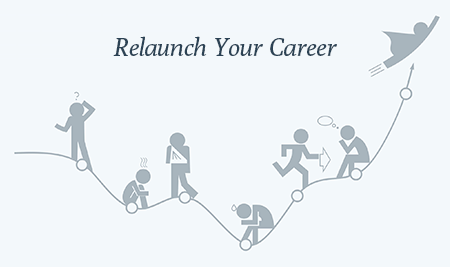So here’s the scenario. You’ve come to the realization you’re unhappy with your career path. You don’t like where it’s headed. You feel out of place. You can’t remember the last time you looked forward to a Monday morning. You feel like your organization doesn’t align with who you are or what you stand for in your career and life. And you’re no longer are proud of your response to the question, “What do you do?”
At first, you had planned to stick things out. You weren’t ready to quit your job. You decided maintaining a steady salary and avoiding a gap in your employment history was more important, so you created some workarounds while hanging onto your job.
You tried to squeeze in your side interests. You tried to tolerate all those unfulfilling projects or meetings. You tried to put your head down, dig in, and make things work.
The problem is, you’re exhausted.
I mean absolutely exhausted. Physically exhausted. Mentally exhausted. Emotionally exhausted from trying to tolerate your job when you knew deep down you were in the wrong company, wrong industry, or wrong career.
All the energy depleting work, not to mention the extra effort you’ve been making to fix your situation, has left you feeling completely spent.
I’VE BEEN THERE
In 2013, I found myself 7 years deep into the world of marketing consumer products for large blue chip companies. I was sitting on a huge global team of marketers, managing advertising campaigns being rolled out across the world. By this point, I had marketed trash bags, drain opener, desserts, and ice cream. Over time, I no longer felt excited by my work.
Each additional day I spent marketing products to consumers left me feeling more and more empty inside.
The problem is, when you have a good job, or at least one that looks good on paper, it’s hard to walk away for a whole host of reasons: money, status, credibility, reputation, social validation, stability, investment, corporate incentives, or even just plain old inertia. You name it. I’ve been there. Every single one of these factors had a way of keeping me firmly planted in jobs even when I was feeling unhappy deep down.
So how can you tell when enough is enough? When it’s time to move on? When it’s time to shift from sticking things out to cutting your losses?
Leaving your job behind is a deeply personal and professional decision. It’s complicated, and your situation is unique to you. In every instance when I chose to leave a job behind, there was NOT this moment of epiphany where the clouds parted to reveal what I should do. Even when I was unhappy, I was really torn and confused about what would be “right” for my career and life. If you’ve ever witnessed a friend who seemed really unhappy at work, and you wondered why he or she didn’t just leave, I can tell you that this decision can look simple from the outside, but when you’re in the middle of it, the decision is rarely simple.
However, there are common signs that suggest it may be time to move on. Signs I’ve experienced myself. The same signs I’ve heard from talking with hundreds of people who have chosen to make a career change.
Here are four signs it may be time for you to move on:
1) WHEN YOU’RE ABSOLUTELY DRAINED
 One of the consistent factors that has led me to pull the plug on an unfulfilling career path is the feeling of physical exhaustion. For most of my life, I’ve worked in comfy office settings, which are not exactly physically demanding by any stretch of the imagination. Still, in the months leading up to resignations, I always noticed feeling utterly drained.
One of the consistent factors that has led me to pull the plug on an unfulfilling career path is the feeling of physical exhaustion. For most of my life, I’ve worked in comfy office settings, which are not exactly physically demanding by any stretch of the imagination. Still, in the months leading up to resignations, I always noticed feeling utterly drained.
When you’re doing work that isn’t fulfilling, it can really sap your energy. When I wasn’t happy with my job, my weekends were spent recuperating and recharging from mentally depleting projects. I vividly recall struggling to keep my eyes open in meetings. I could feel my energy tank dwindling as the day went on. And I had no energy left to exercise or take care of my health, let alone socialize or spend quality time with people I loved. This way of being just isn’t sustainable in the long run.
2) WHEN YOU’RE NO LONGER SERVING YOUR INTERESTS
 As your career evolves, your interest will evolve. When I landed my first corporate marketing job at a large, blue-chip consumer goods company, I was focused on learning the nuts and bolts of marketing, understanding what it’s like to navigate the matrix of a large corporation, and developing a strong set of transferrable, professional coaching skills. I was also focused on growing the brands I managed, a critical part of my role. The corporate world served me well in this context.
As your career evolves, your interest will evolve. When I landed my first corporate marketing job at a large, blue-chip consumer goods company, I was focused on learning the nuts and bolts of marketing, understanding what it’s like to navigate the matrix of a large corporation, and developing a strong set of transferrable, professional coaching skills. I was also focused on growing the brands I managed, a critical part of my role. The corporate world served me well in this context.
Over time though, my interests shifted. Part of the shift was a natural evolution, but another part was driven by external factors. I got married, so family life became more important to me. My father passed away, so taking care of my own health became more salient. I also began to yearn for making a difference in this world, so I wanted to do work I found truly meaningful. My interests in having a strong work-life balance, a healthy lifestyle, and truly fulfilling work were no longer being served by my existence as an employee in the corporate world.
3) WHEN BALANCING IT ALL ISN’T REALISTIC ANYMORE
 Coming to the realization your job no longer fulfills you can mimic some of emotions you go through when dealing with loss. The 5 Stages of Grief is something Elisabeth Kübler-Ross first highlighted her book On Death & Dying. One of those loss stages is “Bargaining.” I refer to this as the Mitigation Stage in my 7 Stages of Career Change Roadmap. Mitigation is when you try to find ways to make your situation more tolerable.
Coming to the realization your job no longer fulfills you can mimic some of emotions you go through when dealing with loss. The 5 Stages of Grief is something Elisabeth Kübler-Ross first highlighted her book On Death & Dying. One of those loss stages is “Bargaining.” I refer to this as the Mitigation Stage in my 7 Stages of Career Change Roadmap. Mitigation is when you try to find ways to make your situation more tolerable.

My business license
For me, this meant taking up a side project. In 2012, I enrolled in a professional coaching program while holding down my full time corporate marketing job. I wanted to feed my desire to have an impact by starting my own business focused on coaching people through the stages of career change.
I began coaching clients in the evenings and weekends. And I loved it. I started doing some pro bono coaching. I quickly began enrolling paid clients. Then, I began to charge more for my services.
My business started to pick up.
The problem was, my full-time job was still my priority. I had just been promoted to a global role, regularly working 50 to 60 hours a week, including odd hours to navigate different time zones, which wasn’t horrible per se, but didn’t leave a lot of time for other interests. I got to a point where I was starting to turn away clients because I just didn’t have the energy, time, or mental capacity to do it all.
At some point, I realized I wasn’t doing any one thing in my life justice. Everything was only getting a fraction of my attention, a fraction of my effort, and a fraction of my time resulting in a fraction of the results. I found myself secretly happy when a meeting got canceled, both at work, and related to my coaching business. I knew something eventually had to give. And I didn’t want to be my business.
Then, in early 2013, a few months into starting my business, almost by design, I stumbled upon this ONION article about cramming your passionsinto your evenings and weekends. I never thought a satirical publication would change my life, but this article convinced me I wasn’t truly honoring my priorities, and something had to change.
4) WHEN YOU FEEL THE TIMING IS RIGHT . . . ENOUGH
 When I was thinking about leaving my marketing job, I actually hired a coach to help me figure things out. The idea of working with someone who could be objective and detached from my situation was appealing. The problem was, once she new I was thinking about resigning from my job, she kept pushing me to do it. I started to feel bad about my inability to pull the trigger. I was struggling to pinpoint an ideal resignation date, and she called me out for unnecessarily postponing the inevitable.
When I was thinking about leaving my marketing job, I actually hired a coach to help me figure things out. The idea of working with someone who could be objective and detached from my situation was appealing. The problem was, once she new I was thinking about resigning from my job, she kept pushing me to do it. I started to feel bad about my inability to pull the trigger. I was struggling to pinpoint an ideal resignation date, and she called me out for unnecessarily postponing the inevitable.
I quickly stopped working with that coach.
No one can know your situation as well as you. You’ll run across people who try to push you to make a decision. Others will call you out for procrastinating. The reality is, only you can know what timing makes sense for your unique situation. Maybe you need to finish up that project see you can leave on good terms. Maybe you need to wait until you get your end of yearr bonus. Maybe the timing just isn’t right at work. Maybe you’re just not ready.
If you have good reasons for staying, stay.
At the same time, no time will ever feel 100% ideal. There will always be reasons to maintain the trajectory of your career. It’s generally easier to convince yourself to maintain the status quo then to make a plunge into the unknown that involves switching costs and a lot of disruption to your career. At some point, when the conditions feel right enough, I believe you just have to make your brave leap to create the positive changes you desire for your career, something I spoke about in my TEDx Talk, Reshaping the Story of Your Career. When you feel ready enough to go, when you’ve tied off as many loose ends as you can, just go.
Trust Yourself
These four sentiments helped me clarify when my situation had gone from tolerable to intolerable. However, only you can know when the timing is right and when the conditions are right for you to call it quits and make a move. Leaving your job behind is a huge deal. Not a decision to be taken lightly. This decision is a deeply personal one, a decision no one else can make for you.
Trust yourself, listen to your intuition, and remember that everyone has limits. When you reach yours, you really owe it to yourself to move on. No one likes to say, “I quit.” But sometimes, you have to let go of one part of your career to make room for something greater.
Where will you draw the line?
So those are four moments to help you clarify when the time has come to move on in your career. To iron out how where you’ll draw the line in your own career, you can download my “Work-Life Scorecard” to help you understand the impact your work is having on different parts of your life. You can also capture what steps you’ll take if your situation crosses over from being bad to intolerable.





Thanks I needed this.
SDP
Glad to hear you found this useful!
Writing it down makes it real.
Yeah, it’s surprising how much of a different it can make to capture your thoughts on paper (or laptop). I find it useful to get things out of my head sometimes.
Thanks for this. I’m obsessed over the content you offer. The ONION article you refer to is on point. Exactly what we all do when playing with the idea of a career change.
Luciana, I’m really happy to hear you’re enjoying my content. And yes, that ONION article couldn’t be more precise!
Since I discovered your YouTube channel, I’m following all your posts. As you said, there is never an ideal moment to leave. I can confirm this. My mother has liver cancer for a year and a half (chronic dependent on chemo) and just now I have found an opportunity to (if they choose me) work only 10 minutes from work instead of one hour and a half (one way). My job for 10 years has felt like some kind of burnout/boreout-feeling job. I had to replace someone else at that time, although I have made clear I wanted that other job in the organization which was for some reasons not possible for me. So my dilemma here: If I’m the one chosen by that organization, will I be able to stand all the stress for learning the new stuff whilst probably trying to cope with a possible loss of my mother at the same time? Not an easy decision, if I would have the job, I would really love to go for it.
Els, I’m happy to hear my posts and YouTube channel have been useful to you. Thanks for sharing your story so transparently with me and my readers. I’ve found in my work with clients that career decisions are rarely straightforward. Typically, people are making choices that serve certain interests in your life while perhaps competing with others. In this case, it sounds like you have an opportunity to make a move into a more interesting role, but that new role may also create increased stressors in your life that you may not have room for given the situation with your mother. There are not easy answers here, but I’d encourage you to consider a couple things:
First, weigh the upside of a more energizing job against the downside of increased demands– All jobs require energy. When you’re doing work you don’t enjoy, that saps energy away from you that not only affects your work but the rest of your life. On the flip side, when you’re doing work you enjoy, it can create a more virtual cycle where the energy your job gives you actually allows you to feel more energized with other parts of your life too. So that’s a long way of me saying that you may want to consider what impact doing a more energizing job could have on your life, and whether that would be enough to offset the additional stressors that come with any job.
Second, consider your priorities at this moment in your life. It’s nearly impossible to make a career choice that enables you to have everything you want in life. I always recommend my clients carefully consider what’s most important for them to have at this specific moment in their life (e.g., health, work satisfaction, family, social life, etc), and make a decision that maximises your chances of having those things most important to you.
I hope these considerations can give you more clarity on what to do next. I also hope your mother’s treatment goes smoothly, and she can make a strong recovery.